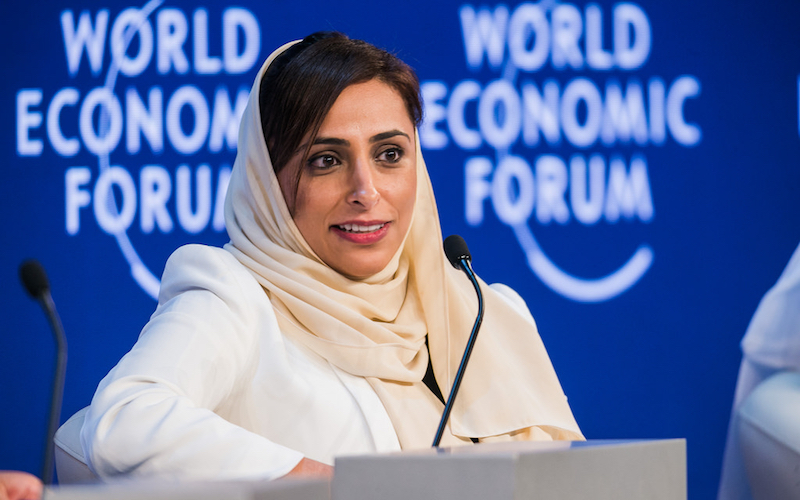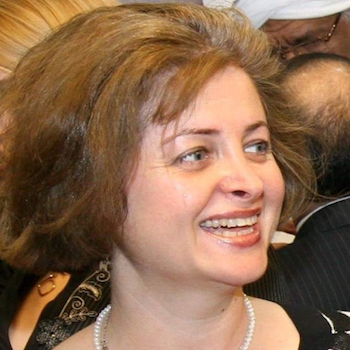
WEF on MENA in Jordan – All about Youth, Women and Entrepreneurship
The appointment of Bodour Al Qasimi as the Chair of the Regional Business Council (RBC) for the Middle East and North Africa during the World Economic Forum on the Middle East and North Africa did not come as a surprise.
The selection of an Arab woman for this global leadership position is a high point for the UAE. The UAE delegation proudly described Al Qasimi’s election as reflecting “the pioneering role and leadership role of Emirati women and an acknowledgement of their outstanding presence and contribution in all walks of life, especially for sustainable development of the UAE and the global economy.”
Those who are not familiar with the UAE may find this statement a bit grandiose. However, the UAE is leading the way in promoting women to leadership positions.
And the figures reflect the evidence of this. In 2016, the UAE’s Minister of Tolerance, Lubna Khalid Al Qasimi, was ranked as the most powerful Arab woman by CEO Middle East magazine for the 6th year in a row. In 2015, the 5th annual list of the 100 most powerful women in the Arab world had Sheikha Lubna on the top of the list and Princess Reem Al Hashimy, managing director of the project Dubai Expo2020 holding the 5th position. In 2014, the 4th annual list of the 100 most powerful women in the Arab world had Lubna Khalid Al Qasimi number 1 and Princess Reem number 3, and out of the 100 women, 23 were based in the UAE. Women account for 27.5 percent of the UAE Cabinet, 22 % of the Federal National Council is represented by women and 66% of governmental jobs are held by women (the average across the world is 48%).
Chaired by Al Qasimi, the Regional Business Council (RBC) for the Middle East and North Africa, representing 40 leading companies, will become a collaborative platform to find solutions for the complex economic, social and humanitarian challenges across the MENA region and deepen partnerships between the public and private sectors, to work on diversification, innovation, economic growth, workforce skills development, entrepreneurship and to increase the female and youth labour forces.
The term “challenge” recurred frequently during the WEF on MENA in Jordan. An official statement of the forum made clear that many of the businesses have been founded under the most challenging of circumstances and “companies across MENA are building their business models, products and services on new technologies such as artificial intelligence, blockchain, and satellite technology and a generational transformation in the Middle East and North Africa is taking place.”
Bodour Al Qasimi also underscored the need to be aware of the challenges ahead, to think of solutions and to have the readiness to respond: “The world economy today faces many challenges that require us to be well-prepared to control their negative repercussions. Hence, relying on its investment offerings and diversified economy, Sharjah has been keen to strengthen its cooperation with various countries, particularly in the Arab region and Middle East, as part of its commitment to Arab and regional economic integration. The WEF, which boasts a long history of extensive participation by world statesmen and business leaders, has generated enormous opportunities for building partnerships.”
Majid Jafar, Chief Executive Officer of Crescent Petroleum, UAE, and co-chair of the 2017 WEF on MENA, said: “This Forum comes at a time of great challenges in the region that you all know reports on, and the aim of the forum is to tell some positive stories of our region that you don’t get reported on, particularly about youth and women! We have 235 women leaders here out of 1,000 participants. We’ve been working on youth unemployment from the bottom up, to provide them with skills. The issue of the role of women is fundamental in the region not only from the moral point of view but also economically speaking. In many countries, women are more than half of the population and also the more educated part of the population and the more hard-working…We’ve seen in Europe that the only way to improve competitiveness is though women empowerment.”
Maurice Levy, CEO of Publicis and co-chair of the 2017 WEF on MENA, described MENA’s evolution during the last 10 years: “It is more buoyant, lots of more energy, more initiatives…Regarding start-ups, MENA is as energetic as the rest of the world! MENA is not short of talent, entrepreneurs or ideas! But there are shortages in enabling these start-ups to develop in a favourable environment and in dealing with unemployment, especially because MENA’s percentage of young population under 25 is very high.”
Khadija Idrissi Janati, founder and Chief Executive Officer, KMK Groupe, Morocco, and co-chair of the 2017 WEF on MENA, stressed the youth unemployment issue and “their aspirations which are changing, they no longer want to be part of the discussion but of the decision-making! They no longer want to be talked about, they want to talk and to be heard!” She also referred to the women “whose aspirations are very different across MENA region because not all the countries managed to implement human rights for women. In some countries of this region, women still need a tutor to be allowed to travel. Women’s rights in the region need a cultural transformation.”
Arif Naqvi, Founder and Group Chief Executive, Abraaj Group, United Arab Emirates, and co-chair of the 2017 WEF on MENA, called attention to the fact that “MENA region is not a monolith, it’s a wide variety with 350 million people out of whom more the 100 million live in cities, and 6 cities only – Casablanca, Tunis, Cairo, Abu Dhabi, Dubai and Riyadh contribute to half of the region’s GDP. It’s a region with challenges and needs to operate more as an economic block. Innovation and entrepreneurship should become a life style because opportunities are great in this region.”
The theme of the World Economic Forum (WEF) on the Middle East and North Africa which was held in Jordan was ‘Enabling Generational Transformation,’ As the theme highlights, the Arab world is making efforts to internalize its current needs and to meet them appropriately. More than 1,100 business, government and civil society officials as well as representatives of international organizations attended the forum. The phrase “focus on development and keenness to exchange experiences and knowledge” was, during the WEF in Jordan, the beacon to orient future thinking and to organization. Delegates from the Middle East and North Africa streamlined their economic, socio-cultural and humanitarian issues in a much more acute way than the rest of the world sometimes does it.

